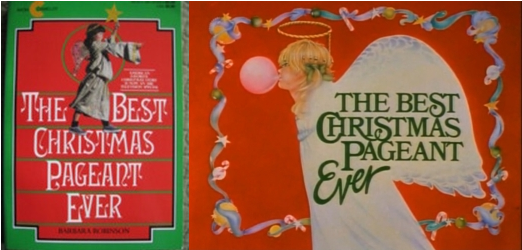The Herdmans were absolutely the worst kids in the history of the world. They lied and stole and smoked cigars (even the girls) and talked dirty and hit little kids and cussed their teachers and took the name of the Lord in vain and set fire to Fred Shoemaker’s old broken-down toolhouse.
Thus begins the Christmas book I read most often as a child. One of my son’s godmothers once played Alice Wendleken in a play version of it. A handful of you are probably shocked that I’m covering this book, and the made-for-TV-in-Canada movie version of it from 1983, in today’s column. The rest of you have never heard of this and are proving my point. It is a delightful book; I’m currently reading it a chapter at a time to my son as a bedtime story; even though it’s explicitly Christian, I think he’s going to enjoy it.
The nameless narrator tells us the story of the Herdman family. There are six Herdman children, each about a year apart. They are Ralph, Imogene, Leroy, Claude, Ollie, and Gladys. The narrator is in fourth grade along with Imogene. Her brother Charlie is in third with Leroy. One day, in despair at having his dessert stolen by Leroy three days running, Charlie lies and says they get all the dessert they could possibly want in church. Which is simply the wrong thing to say if you want the Herdmans to stay away. And the day they arrive is the day they’re setting things up for the church Christmas pageant.
The woman who runs it has broken her leg, and it takes three other women to take over everything she runs; the narrator’s mother takes over the pageant. She cannot stop Ralph and Imogene from taking the role of Joseph and Mary; the minister’s son typically plays Joseph and doesn’t want to, and Imogene intimidates Alice Wendleken out of volunteering for Mary the way she always does. Similarly, the other three boys are the Wise Men, and Gladys is the Angel of the Lord. And while some things go the way everyone expects them to, others very much do not.
The movie trims a lot, but in many ways it’s so accurate an adaptation that the narrator—named Beth Bradley and played by Baby Fairuza Balk in her debut—routinely breaks the fourth wall and delivers narration directly to the camera. Her mother is Loretta Swit; the rest of the cast is unremarkable, though it’s Canadian enough so that two of the people in it have done Due South. Still, since there’s nothing much given in the way of detail about location, why not set it in Vancouver? Or just continue not to mention where it’s set, which is of course what they do.
It’s a very Christian story—it is, in fact, a redemption story. I won’t give spoilers here, but the first we learn that the Herdmans aren’t all bad is when they are told the Christmas story for the first time, by “Mother” during the first rehearsal, and immediately leap to the defense of the Holy Family. They do indeed have a violent response to the story, but their violent response is wanting to go kill Herod. This is even despite the implication that Herdmans are born bad. Though as an adult, I do find myself wondering a lot more about how little parenting they got, even by ‘70s standards. Still, the Herdmans show glimmers of improvement starting in chapter four.
Even as a child, the two characters I liked least were Helen Armstrong, who’d always run the pageant before, and Alice Wendleken, with a certain amount of loathing left over for Mrs. Wendleken, Alice’s mother. Mrs. Armstrong is just insufferable and believes that the whole church will grind to a halt without her. Meanwhile, Alice is described as “so nasty-clean that she had detergent hands by the time she was four years old.” Alice is a know-it-all—well, so was I as a kid, but still—and a prig, and she’s so proud of her perfection that she fails to miss that it makes her pretty imperfect.
What the Herdmans do is bring humanity to the story. When Mother is telling the story, she’s reading to them from King James, of course. Which refers to Mary as being “great with child,” something the Herdmans immediately translate as “pregnant.” Even the narrator feels uncomfortable with Mary’s being something as prosaic as pregnant, and later, she’s amazed to really think about the history of the Holy Family, that they were away from home and possibly scared. “. . . Stuck away in a barn by people who didn’t much care what happened to them,” in fact. And you can argue all you want about the translation issues there—King James is a terrible translation, for all its language is beautiful, after all—but it’s the version of the Holy Family that has come down to us for centuries.
The Herdmans may well have been the worst kids in the history of the world. And it was clearly from the cradle; Imogene is just fine not having a real baby to play Jesus because “real babies bite.” But they are still, at their heart, kids. Their father jumped a train when Gladys was two; their mother works double shifts at the shoe factory. The oldest of the Herdmans is a grade ahead of my son. Imogene is his age. Gladys is a year older than my daughter. Everyone in the nameless town hates the Herdman kids, and, sure, they’re far worse than mine. But there are plenty of people who think they have a good reason to hate far better kids than these.
Next month, we’ll be going back to Disney with a couple more unusual kids disliked by lots of people. Join us for Escape to Witch Mountain! As always, if you enjoy these columns, it would really help me out if you’d contribute to my Patreon or Ko-fi!


